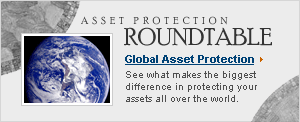Asset Protection Scams - Caveat Emptor
For those unfamiliar with business law (let alone Latin), the term "Caveat Emptor" means "let the buyer beware." I think that another way of phrasing it would be the old adage "If it sounds to good to be true, it probably is!" Watch out for the common asset protection scams outlined below. If some shady promoter of domestic asset protection offers you the opportunity to sign up for any of these asset protection scams: RUN. You are about to spend lots of money for nothing but trouble masquerading as asset protection. NEVER do anything without clearing it with both your CPA and a local lawyer and you should be safe. Read on:
As it is with anything you want to buy, you have to shop carefully and be especially observant with what you're looking for. Take asset protection, for example. I believe your main goal is to protect your hard earned money and property from creditors and plaintiffs. You want to leave what you have to your descendants when you pass on. All of this is very understandable.
However, there are people out there who, intentionally or not, will try to sell you asset protection programs that are both useless and potentially harmful. Here are a few of the well known ones:
Bearer Shares: AKA Nevada Corporations
This is a scam in which you pay thousands of dollars for some basic information worth $15 which talks about the benefits of Nevada corporations. Armed with that information, you launch yourself as an asset protection advisor.
Following that, you then charge your clients thousands of dollars for setting up Nevada corporations (which, in actuality, could be set up for just a few hundred dollars). You inform your clients that these are "foolproof" structures, and that all creditors will be frustrated by the "Bearer Shares", even though ownership can be imputed even when the bearer shares can't be found, and the law of Nevada doesn't apply when the person and their assets are in another state.
Then, you have to hire your own lawyer for a number of reasons, such as:
(1) The tax bill for the entity comes due, and you haven't a clue how to advise your client about correctly structuring and funding these entities; or
(2) Your client gets sued by a creditor, who adds you as a co-defendant on a civil conspiracy claim; or,
(3) Your client gets sued by the U.S. government who then files money laundering charges against you.
Pure Trust Scam
This is the most widespread asset protection scam. This scam involves a non-existent and illegal form of trust and, in an attempt to keep one step ahead of law enforcement, it goes by a number of aliases, such as Constitutional Trust, Patriot Trust, Common Law Trust, Business Trust, Common Law Trust Organization, Foreign Common Law Trust Organization, and so on.
The scam artists pushing these trusts have a lot of credible sounding reasons why they should defeat creditors. However, the truth is that Pure Trusts are easily dismantled by creditors under a bunch of theories, including that they are "self-settled spendthrift trusts", that are for illegal purposes (such as tax evasion), that they are a sham, and that any transfers made to the trusts are fraudulent conveyances.
A Pure Trust is often part of a three-tier trust structure purporting to hide the existence of the trust (and also making the structure tax free). In reality, however, a Pure Trust doesn't do anything except make it seem like the structure is worth the cost (which it isn't).
The IRS chases after Pure Trusts because the service has never lost a case against the Pure Trust. The IRS knows it can easily grab the assets to satisfy the taxes, interests, and heavy penalties which are awarded by the court.
They are also illegal and often result in criminal penalties including time in the slammer with Bubba.
Asset Protection Seminar Scams - There are quite a number of reputable asset protection planners who give yearly seminars. The majority of them, however, spend most of their time assisting their clients. In fact, most of the best planners limit themselves to presenting no more than a dozen appearances per year.
The people usually seen presenting asset protection seminars are the scammers. These people make their money by presenting expensive seminars which cost an average of $1500 or more per person (while the real value is $300), or giving cheap seminars that cost $15 per person where they make their profits selling worthless books, partnership and trust forms, and other useless material for thousands of dollars (at one seminar, a scammer was touting a $2500 "do it yourself asset protection kit.")
Anyone attending these seminars discovers that the promoters inevitably announce that they are selling asset protection materials at the back of the room. When this announcement is made, there are people who literally jump up out of their seats and, checkbooks in hand, rush to the back of the room. Don't let this fool you; most of these people are "shills" paid by the promoters to do this, making it seem as if there is really a great interest in the worthless materials they're selling.
Asset Protection Kits - These are nothing more then "do-it-yourself" packages purporting to allow purchasers to create a "one-size-fits-all" asset protection plan. The quality of these plans is highly suspect, and compounded by the fact that, in the majority of cases, the purchasers never implement the plans correctly, often leading to very negative tax consequences.
Asset Protection "Institutes" - There are no Asset Protection "Institutes" where learned scholars sit and discuss asset protection issues. These so-called institutes are nothing more than a group of marketers who put the "institute" together to give this impression. This practice, although it isn't illegal, is very misleading.
These are just a few of the asset protection scams being promoted by unscrupulous people. However, I would also like to state that there are many accountants, estate planners and attorneys who, with the best intentions in mind for their clients, try to implement asset protection plans without having full knowledge of how to properly do so. Because of this, their clients suffer.
The best advice I can give is to find someone who is a real-world asset protection planner, and not a member of some Institute (which means that they are merely part of somebody else's referral network). Make sure you always involve your local CPA and attorney.
Another bit of advice is you get what you pay for. If you want to implement a solid, nearly bullet proof kind of asset protection plan, you will have to spend some money to do so. A good asset protection planner does not come cheap. If someone says that they can do a better job for less, be very wary.
Finally, the bottom line is this: Asset Protection does not entail hiding your assets, secret bank accounts, or moving offshore. And, most of all, it does not exempt you from paying taxes!

ASSET PROTECTION SCAMS

EDUCATION PRODUCTS

Asset Protecion Training
If you are looking for the most important concepts in Asset Protection, this is where to start! If you need to talk intelligently about protecting your net worth or you are a professional this online training program is for you!

Free Asset Protecion Course
Get our Free Online Asset Protection Video Course.
Learn how to protect yourself like the pros!


Asset Protection in a Nutshell
Clear, concise and straight forward, this e-Book will help you make sound decisions with your business and personal assets..

Protecting Assets - 70+ Video Lessons + 3 Ebooks
This e-course will give you straight forward asset protection advice you can implement now. One of the best asset protection courses available! Includes 70+ video lessons, 3 Ebooks, and 6 example legal documents!

Advanced Estate Planner
The key to a solid Asset Protection Plan is the Estate Plan. This downloadable estate organizer will help you keep track of important information about your assets and important legal documents all in one place.
















